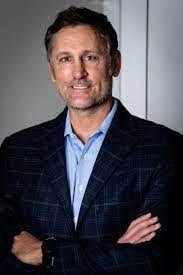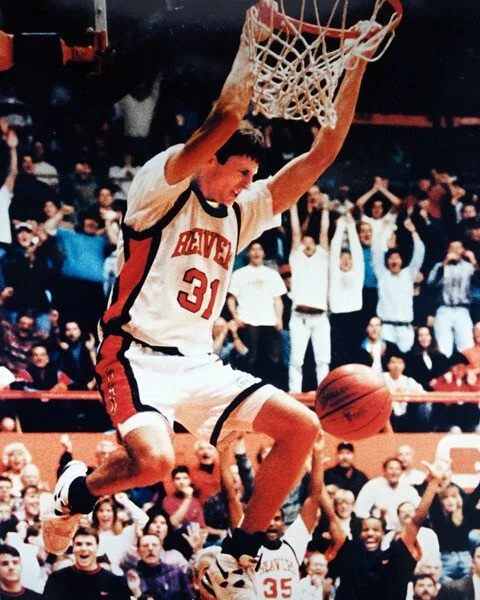Brent Barry: Oregon State ‘provided the opportunity for me to grow’
Brent Barry did not realize all of his dreams during his five years at Oregon State.
The Beavers did not win a Pac-10 championship or even experience a winning season. After Barry’s senior campaign, Coach Jimmy Anderson was fired.
It says something about Barry, however, that team success was a priority. And it’s part of the reason why he would go on to a successful 14-year NBA playing career and help the San Antonio Spurs claim championships in 2005 and ’07.
Barry was never an All-Star or even a star in the NBA, and he came off the bench more times than he started during a career that saw him play in 912 regular-season games and 88 playoff contests. But Barry was a critical piece and cherished asset on every team for which he played. He was versatile and a team guy all the way.
“When I think about my time at Oregon State, I think about the opportunity for me to grow,” Barry says in a Wednesday phone conversation from New York City, where the Spurs were preparing to play the Knicks at Madison Square Garden. “Sometimes growth happens not because everything is going right, but when things aren’t all lined up. That’s what happened with me.”
Barry, now in his fifth year as the Spurs vice president/basketball operations, is part of the 2023 class for the Oregon State Athletics Hall of Fame that will be inducted Friday night in the Toyota Club at Reser Stadium.
Barry flew into Eugene on Thursday and be on hand for the weekend’s festivities, which includes Friday’s banquet as well as the Beavers’ basketball game against Troy and Saturday’s football game against Stanford.
How does Barry, 51, feel about becoming a Hall of Famer?
“I’ll say the cliche thing,” he says. “It makes me feel older than I should. Really, it’s a tremendous honor. I’m humbled by it. I’m looking forward to seeing some friendly faces and enjoying a weekend back in Corvallis, where I haven’t been in quite a few years. I’m excited to see Coach (Wayne) Tinkle and be there for all the events.”
Brent is the son of Naismith Hall of Fame forward Rick Barry and youngest of four basketball-playing sons to Rick and Pam Barry; Brent, Jon and Drew all played in the NBA. Brent, however, was scrawny coming out of De La Salle High in Concord, Calif., in 1990.
“When I got to Oregon State, I was 6-3 and about 160 pounds,” Barry says. “That’s where the ‘Bones’ nickname originated.”
Brent Barry averaged 21 points and was first-team All-Pac-12 as a senior at Oregon State in 1994-5 (courtesy Dave Nishitani)
I recalled Barry being known as “The Condor” while at OSU — he could jump out of the gym and fly through the air — but he corrected me.
“They floated that around, but it never stuck,” he says. “(Teammate) Scott Haskin started calling me ‘Bones,’ and that did stick.”
Probably because of his thin frame, and without much foresight in the genes category, Barry slipped through the cracks in winding up at Oregon State.
“I was not very highly recruited,” he says. “I had thoughts about going to prep school. Even our local schools, Cal and Stanford, didn’t recruit me that heavily. Oregon State was on me pretty early.”
In the summer after Barry’s junior year at De La Salle, OSU assistant coach Jim Shaw scouted him at a camp in Santa Barbara, Calif., run by Snow Valley Basketball Schools.
“I was there to eat drink and sleep basketball for a week,” Barry recalls. “It was a slice of heaven for me. There were some incredible coaches there that week. Jim watched me play and started talking to me. I ultimately decided on Oregon State because of his introduction to the school.”
Shaw, now associate head coach at Washington State, was unaware he was watching Rick Barry’s offspring.
“I didn’t know Brent’s lineage,” says Shaw, 60. “He was skinny and weak physically, but he had exceptionally long arms, big hands and really good floor vision. He turned the ball over a lot, but he was extremely fast, and some of the things he was doing — the way he was seeing the game — were unique. I thought, ‘This guy has a chance to be an NBA player.’ When I found out who he was, I was convinced he was an NBA prospect.
“Recruiting was different in those days. There were really no analytics. You went on what you saw and what you believed. I believed in Brent from Day One. I was as convinced and convicted as a coach could be.”
Barry redshirted his first year (1990-91), then played four years for Anderson.
“I have fond memories of growing up in Corvallis,” he says. “I mean that in a lot of ways. Oregon State provided an opportunity for me to grow as a person and a player. I’m thankful they believed I could be a part of things and try to help the program along.”
Barry arrived after Gary Payton’s senior year, during which the All-America guard was named National Player of the Year in leading Oregon State to a 22-7 overall record, 15-3 in Pac-10 play, and the conference championship. During Barry’s redshirt season, the Beavers went 14-14 overall and played fifth in the Pac-10 with an 8-10 mark. Senior forward Teo Alibegovic was the star on that team, a first-team All-Pac-10 selection who would go on to play professionally in Europe for 12 years and become the No. 2 all-time scorer for the Slovenian national team.
Barry’s redshirt freshman campaign of 1991-92 saw Oregon State finish 15-15 (7-11 in Pac-10 action) behind the play of juniors Haskin, Chad Scott and Charles McKinney. Brent started 13 of 31 games and averaged 5.2 points, 2.3 assists and 1.5 rebounds. That was the season in which guard Earnest Killum died from a stroke while on a road trip to L.A., which cast a pall on Anderson’s program from which it never recovered.
With Haskin, Scott and McKinney as seniors, forward Mustapha Hoff a junior and Barry a sophomore, the Beavers were 13-14 overall and 9-9 for fifth place in the Pac-10 in 1993-94. Brent started in 17 of the 23 games he played, averaging 7.2 points, a team-high 3.6 assists and 2.1 rebounds.
Things took a nosedive in 1993-94, when OSU went 6-21 overall and finished last in the Pac-10 at 2-16.
The bright spot was Barry, who averaged a team-high 15.2 points along with 5.2 rebounds, 3.5 assists and 2.4 steals while shooting .498 from the field and .365 from 3. With Hoff redshirting, Barry was surrounded by a forgettable roster that included point guard Stephane Brown, forward Kareem Anderson and center Jerohn Brown as starters.
Barry’s game really blossomed as a senior in 1994-95. By this time, Barry had filled out to 6-6 and 185 and was a first-team All-Pac-12 selection. He had a huge season, averaging 21.0 points, 5.9 rebounds, 3.9 assists and 2.7 steals while shooting .514, .394 and .823. Hoff was back to average 18.8 points and 7.5 rebounds, but there wasn’t much help beyond that. The Beavers were 9-18 overall and seventh in the Pac-10 with a 6-12 record. Soon thereafter, Anderson was let go.
“I enjoyed Coach Anderson,” Barry says. “He is one of the most authentic people I have known. He cared about the kids in the program. Jimmy was fair and a good man.
“What sticks with me about those years is that we weren’t able to elevate the program. Seasons were long and frustrating. A lot of guys transferred away. The program was in a state of flux with Coach (Ralph) Miller’s retirement and Coach Anderson taking over. None of those things were stopping me from continuing to be optimistic and to work hard and to try to do the best I could and make something of the situation. In a lot of ways, that happened. As far as team success, I wish we’d had more.
“Deep down, I don’t know if I did enough on the floor in the way I wanted to, with the results and the seasons we had. But I’m hopeful I gave back since then in the choices I have made and the way I’ve represented the school after my time there.”
Barry left having made a great impression on his coaches and teammates at OSU.
“Brent was articulate, bright, funny, quick-witted,” Shaw says. “He was likable, had high character. He had everything you would want from an intangibles standpoint.”
Barry was chosen by Denver with the 15th pick in the 1995 draft and traded immediately to the Clippers, for whom he played for his first 2 1/2 seasons. I remember Brent inviting me to dinner with him and then-wife Erin at their Manhattan Beach home when I was in the area and writing a story about him his rookie year. That was an unusually nice way for an NBA player to treat a member of the Fourth Estate.
The next year, Barry distinguished himself by claiming the slam dunk title as part of All-Star Weekend. Across four decades, he was the only white player to have won the contest until 6-2 guard Mac McClung — whose NBA resume includes four career games — ruled in February 2023.
Barry’s career numbers are solid. He averaged 9.3 points, 3.2 assists and 3.0 rebounds while shooting .460 from the field, .405 from 3-point range and .823 from the foul line. Barry led the NBA in 3-point percentage (.476) with Seattle in 2000-01 and in effective field goal percentage twice.
After retirement as a player in 2009, Barry did some broadcasting before landing with the executive position in San Antonio, where he played for coach Gregg Popovich from 2004-08. Barry is also in his second year as general manager of the G-League Austin Spurs.
Barry won NBA championships with the San Antonio Spurs in 1994 and ‘95
“It has been fantastic, a wonderful opportunity,” Barry says. “Having played for Pop and being part of the organization as a player, I learned certain things aren’t happening just because one person is doing it. Pop has a team of people who care and are professionals and have been integral to all the development that goes on in San Antonio.
“It’s the gold standard for an NBA franchise. Having a chance to peek behind the curtain and be part of that ecosystem gives me some true appreciation for what it takes to get to the top.”
The Spurs drafted David Robinson No. 1 in 1989, which started them on the road to playoff success. They drafted Tim Duncan No. 1 in 1997, and two years later — behind the twin towers — won the first of five NBA titles over a 15-year span. This past June, they used the No. 1 pick to select 7-4 Victor Wembanyama, who is already taking the league by storm.
“Victor is fantastic,” Barry says. “To think the Spurs organization would have the opportunity to draft three transformational big men to not only steady the franchise, but also have value in its success on the court to reach championship levels? We think Victor is the kind of guy who can do it. But it’s not about what we think. He believes he will do that. That’s inspiring to come from a 19-year old kid.”
► ◄
Readers: what are your thoughts? I would love to hear them in the comments below. On the comments entry screen, only your name is required, your email address and website are optional, and may be left blank.
Follow me on X (formerly Twitter).
Like me on Facebook.
Find me on Instagram.
Be sure to sign up for my emails.


